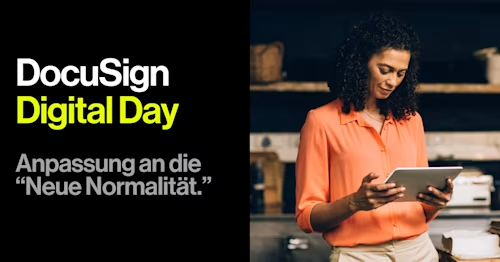
Fragen und Antworten vom Docusign Digital Day
Wir haben für Sie alle wichtigen Fragen und Antworten über die Docusign Agreement Cloud von unserem Docusign Digital Day kompakt zusammen gefasst.
- Die "Neue Normalität": Es geht weiter im Betrieb mit papierlosen Vetragsmanagement in allen Bereichen.
- Mit der elektronischen Signatur die Produktivität steigern. Eine Einführung.
- Docusign Contract Lifecycle Management: Die Komplettlösung für Ihre digitalen Verträge.
- Beschleunigen Sie Ihre Vertriebsprozesse mit Docusign für Salesforce
- Kundenerfolg: Delivery Hero
Inhaltsverzeichnis
- Die "Neue Normalität": Es geht weiter im Betrieb mit papierlosen Vetragsmanagement in allen Bereichen.
- Mit der elektronischen Signatur die Produktivität steigern. Eine Einführung.
- Docusign Contract Lifecycle Management: Die Komplettlösung für Ihre digitalen Verträge.
- Beschleunigen Sie Ihre Vertriebsprozesse mit Docusign für Salesforce
- Kundenerfolg: Delivery Hero


Letzte Woche hat unser Docusign Digital Day stattgefunden. Unsere vier Webinare haben die Docusign Agreement Cloud durchleuchtet und wertvolle Digitalisierungstipps an unsere Zuhörer weitergegeben. Wir haben für Sie in diesem Blog die wichtigsten Fragen und Antworten für Sie zusammengefasst.
Thema des Webinars Nummer 1:
Die "Neue Normalität": Es geht weiter im Betrieb mit papierlosen Vetragsmanagement in allen Bereichen.
Wie können Sie Ihr Geschäft in der "Neuen Normalität" am Laufen halten?
In unserem ersten Webinar stand die Betriebskontinuität im Mittelpunkt. Unternehmen, die sich nicht an die "Neue Normalität" anpassen können, werden in Zukunft womöglich Probleme feststellen müssen. Mit der Docusign Agreement Cloud können Sie in ein papierloses Vertragsmanagement starten - ohne lange Implementierungsprozesse und hohe Kosten. Mit der Docusign Agreement Cloud können Sie effektiver, kostengünstiger und ressourcenschonend Geschäfte abschliessen und auch in Krisenzeiten am Laufen halten.
Eine von Forrester Consulting durchgeführte Studie hat gezeigt, dass 98% der Unternehmen Probleme bei der effizienten Vorbereitung, Unterzeichnung, Ausführung und Verwaltung von Vertragen haben. Digitalisieren Sie Ihr Vertragsprozesse und grenzen Sie sich von anderen Unternehmen ab.
Mit der Docusign Agreement Cloud können Sie das Vorbereiten, Signieren, Handeln und Verwalten von Verträgen folgendermaßen digitalisieren.
Thema des Webinars Nummer 2:
Mit der elektronischen Signatur die Produktivität steigern. Eine Einführung.
Wie können Sie die Produktivität mit der elektronischen Signatur steigern?
Die elektronische Signatur hat unzählige Vorteile. Docusign ist die Nummer 1 unter den elektronischen Signaturen und ermöglicht Ihnen ortsungebunden, von jedem Gerät und zu jeder Zeit Unterschriften zu tätigen und einzuholen. Mit der elektronischen Signatur können Sie auf Einscannen, Faxen, E-Mails und Papierberge verzichten und stattdessen Unterschriften innerhalb von Minuten unterschreiben lassen.
Wichtige Fragen aus dem zweiten Webinar zur elektronischen Signatur:
Frage: Ich habe gehört, dass die Fortgeschrittene Signatur die Beweislast vom Ersteller eines Vertrages zum Empfänger eines Vertrages umkehrt - ist das richtig?
Antwort: Die fortgeschrittene Signatur ist lediglich eine andere Art der Unterschrift und ändert nichts an der gerichtlichen Beweisführung.
Frage: Können Vertragspartner ohne Docusign-Account/Lizenz Verträge mit der fortgeschrittenen/qualifizierten Signatur unterschreiben?
Antwort: Ja, das können sie. Die Empfänger benötigen keinen Docusign Account - egal ob eine einfache, fortgeschrittene oder qualifizierte E-Signatur abgegeben werden soll.
Frage: Wie wird die 2FA bei der fortgeschrittenen Signatur realisiert bzw. bei der qualifizierten Signatur die ID-Überprüfung? Fallen in diesen Fällen Kosten an?
Antwort: Für die 2-Faktor Authentifizierung wird eine Mobilfunknummer des Empfängers benötigt. Bei der fortgeschrittenen E-Signatur kann aber auch mit einem ID-Check gearbeitet werden.
Bei der QES wird hauptsächlich eine Video-Identifizierung benötigt. Hier trägt der Absender die zusätzlichen Kosten. Für den Empfänger fallen keine Kosten an.
Thema des Webinars Nummer 3:
Docusign Contract Lifecycle Management: Die Komplettlösung für Ihre digitalen Verträge.
Wie können Sie Vertragsprozesse in einen automatisierten Workflow umwandeln?
Um Ihre Vertragsprozesse vollständig zu digitalisieren sollten Sie jedoch auch die Prozesse vor und nach der Signatur digitalisieren. Mit Docusign Contract Lifecycle Management, kurz CLM, können Sie Ihren Vertragszyklus in einen digitalen, automatisierten Workflow umwandeln, auf den von überall aus zugegriffen werden kann.
Mit Docusign CLM können Unternehmen:
Flexibel sein und sich an jede Situation anpassen
Manuelle Aufgaben digitalisieren
Komplexe Arbeitsabläufe orchestrieren
Unnötige Fehler und Risiken umgehen
Wichtige Fragen aus dem dritten Webinar zum Thema CLM:
Frage: Gibt es ein Alerting wenn zum Beispiel Verträge auslaufen oder zur Verlängerung anstehen?
Antwort: Sie können Erinnerungen aktivieren, damit der Unterzeichner automatisch per E-Mail erinnert wird. Wenn Sie Erinnerungen aktivieren, müssen Sie angeben, wann und wie oft Benachrichtigungen gesendet werden sollen. Die angegebene Anzahl der Tage vor dem Senden der ersten Erinnerung sollte kleiner als die Anzahl der Tage für die Ablaufzeit sein. Mehr dazu hier.
Frage: Kann ich CLM auch ohne SFDC nutzen?
Antwort: Ja, das kann man. CLM hat viele mögliche Integrationen und benötigt daher nicht SFDC.
Frage: Was ist bezüglich Templates (Layout) möglich - alles was in Word so möglich ist? (Tabellen, Tabulatoren, etc.)?
Antwort: Sie können ein formatiertes Word Dokument als Template heranziehen. Ob die Merge Tags im normalen Text, in Tabellen oder vor/hinter Tabulatoren sind, ist dabei flexibel und unkritisch.
Thema des Webinars Nummer 4:
Beschleunigen Sie Ihre Vertriebsprozesse mit Docusign für Salesforce
Wie können Sie mit der Docusign für Salesforce Integration komplexe Prozesse vereinfachen?
Docusign für Salesforce ermöglicht es Daten einfach aus dem bereits bekannten CRM-System (Sales Cloud, Service Cloud) in Docusign zu übertragen und die fertigen Verträge dann als Objekt an dem Kundenvorgang wieder im CRM System anzuhängen. Dies ermöglicht einfache und nachvollziehbare Prozesse - und das ganz papierlos.
Um die 10 jährige Partnerschaft zwischen Docusign und Salesforce zu feiern, haben wir Kathrin Milhalus-Dianovski, AVP Enterprise Sales bei Salesforce, zu unseren Digital Day eingeladen. In unserem Interview äußerte Sie, dass die Partnerschaft und Integration für die Digitalisierung enorm wichtig ist.
Kundenerfolg: Delivery Hero
In unserem letzten Webinar hat Torben Hein, Director of Salesforce Product Management bei Delivery Hero, über die Nutzung von Docusign für Salesforce gesprochen. Besonders in der Krisenzeit benötigte Delivery Hero eine digitale Lösung, um Restaurants in Österreich schnell onboarden zu können.
Warum hat sich Delivery Hero für Docusign entschieden?
Große Nachfrage nach elektronischer Signatur von einzelnen Ländern
Auflistung der Anforderungen und Suche eines Anbieters
Große Flexibilität erforderlich
Verschiedene Sprachen
Verschiedene Corporate Designs, Logos
Verschiedene juristische Anforderungen
Verschiedene Templates
Sie haben unser Docusign Digital Day Webinar verpasst, aber würden gerne eine Aufzeichnung ansehen? Klicken Sie hier auf ihr gewünschtes Thema, um zum gewünschten Webinar zu gelangen.
Ähnliche Beiträge
Docusign IAM ist die Vertragsplattform, die Ihr Unternehmen braucht



